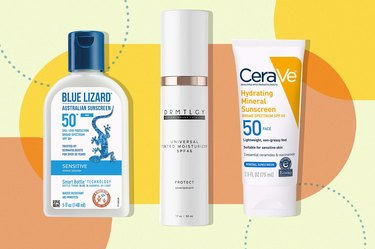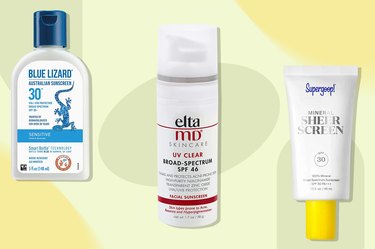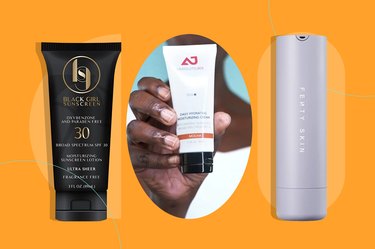
Regularly applying sunscreen is one of the best ways to reduce skin cancer risk. But growing concerns over the ingredients in some sunscreens might have you wondering: Is my SPF actually doing more harm than good? Can sunscreen cause cancer?
Shifting ingredient standards, environmental concerns and recent product recalls about sunscreen have some people worried. But that doesn't mean you should toss your bottle or tube willy-nilly. Here's what you need to know about the safety of sunscreen — and why it's still essential for healthy skin.
Video of the Day
Video of the Day
Why Are People Worried About Sunscreen Causing Cancer?
There are two types of sunscreen: Chemical sunscreens, which are absorbed into the skin and rely on chemicals such as oxybenzone and avobenzone to protect from the sun's harmful UV rays, and physical sunscreens that sit on top of the skin and contain minerals like zinc oxide and titanium dioxide, which reflect the sun's rays.
Chemical sunscreens are highly effective, but research published January 2020 in JAMA found that the use of sunscreen containing these ingredients results in high levels of the ingredients being absorbed into the bloodstream. The study authors pointed out, though, that high blood concentrations of an ingredient doesn't automatically mean that the ingredient is unsafe.
These blood concentrations were deemed higher than what's considered safe by the FDA, which prompted the FDA to call for more data on the ingredients to determine if they should continue being used in sunscreens. Those investigations are currently underway, with the FDA slated to issue a final ruling sometime in 2024.
At the same time, environmental experts have raised concerns about the effects of oxybenzone and avobenzone on marine life, because sunscreen can rinse off of skin when we enter the water. That can affect the health of coral reefs, algae, fish, dolphins and other sea creatures, according to the National Ocean Service.
Recent sunscreen recalls haven't done much to improve sunscreen's public image. In summer 2021, both Johnson & Johnson and Coppertone issued voluntary recalls after some of the manufacturers' spray sunscreen products were found to contain low levels of benzene. Benzene, which isn't supposed to be used in sunscreen products, is a compound linked to the development of some cancers, according to the Environmental Protection Agency (EPA). (The manufacturers did not say how benzene ended up in their products.)
How Is Sunscreen Regulated?
The FDA classifies sunscreen as a cosmetic. This means manufacturers must share data about the safety and effectiveness of individual ingredients so the FDA can check to make sure the ingredients don't cause serious health problems, according to the American Cancer Society.
Products that the FDA deems acceptable are classified as Generally Recognized As Safe and Effective, or GRASE. Right now, ozybenzone and avobenzone, along with several other common sunscreen ingredients like zinc dioxide and titanium dioxide, are classified as GRASE, per the American Academy of Dermatology (AAD). The current FDA review will determine whether oxybenzone and avobenzone should continue to be designated as GRASE, per the FDA.
Experts point out that just because ingredients like oxybenzone and avobenzone are being reviewed for safety doesn't actually mean they're bad for you. Instead, it simply means the FDA is gathering additional data to learn more about the ingredients' safety profile.
Right now, "we do not have enough information to know if they actually have a negative impact on our health from absorption," says Erum Ilyas, MD, FAAD, a board-certified dermatologist at Schweiger Dermatology in Philadelphia, Pennsylvania.
Why You Should Continue to Wear Sunscreen
Whether certain sunscreen ingredients have possible health risks is yet to be determined. What experts can say for sure? "We do know that they have a positive effect on our health by reducing the incidence of skin cancer. This is important to understand," Dr. Ilyas says.
In other words, just because some ingredients are under review doesn't mean you should stop wearing sunscreen. Regular sunscreen use is still crucial for protecting your skin against skin cancer, according to the AAD, American Cancer Society and the FDA. (You might not want to sleep with sunscreen on, though.) That's true even if you never get a sunburn. You'll also want to check your skin for itchy moles, misshapen moles or other abnormalities, just in case.
"The benefits of sunscreen are still thought to outweigh the risks at this time," says Marisa Garshick, MD, an assistant clinical professor of dermatology at Cornell – New York Presbyterian Medical Center. "It also shouldn't necessarily be concerning that the FDA is reviewing safety data. In fact, it should be considered reassuring that we know a lot is being considered prior to the FDA offering a formal recommendation."
For now, the only sunscreens experts recommend steering clear of are those that have been specifically recalled, per the FDA. You can find the most current list of the FDA's recalled products on its website.
Alternatives to Chemical Sunscreens
If the idea of slathering on a sunscreen with TBD ingredients doesn't sit well with you, you've got options. "We have other ingredients to choose from," Dr. Ilyas says.
Remember, regularly using sunscreen protects your skin from damage caused by the sun's UV rays, which can reduce your risk for skin cancer. Rather than use a sunscreen containing chemical ingredients like avobenzone or oxybenzone, you can switch to a physical sunscreen containing mineral ingredients like zinc dioxide or titanium dioxide, say Dr. Garshick and Dr. Ilyas.
Unlike chemical sunscreen ingredients, which are absorbed into the skin, mineral sunscreen ingredients sit on top of your skin without getting absorbed. They're considered GRASE by the FDA and, unlike their chemical counterparts, aren't currently being reviewed for safety.
"Mineral sunscreens are a great option for those concerned about chemical sunscreens, as they are considered both safe and effective," Dr. Garshick says. They're also a better choice for the environment, because they haven't been shown to affect marine life. (Try one of these expert-recommended picks.)
As for options like European sunscreens, which some people think are "cleaner" than the ones sold in the U.S.? It's best to steer clear, per the American Cancer Society. There's limited information on their safety and efficacy, so it's harder to say whether they'll truly protect your skin or pose health risks.
The Bottom Line
At this time, there is no evidence that sunscreen causes cancer. We do know, though, that regular use of sunscreen helps protect against skin cancer, so you shouldn't skip it.
If you're worried about the safety of ingredients in chemical sunscreens, consider opting for a mineral-based sunscreen instead — look for active ingredients like zinc oxide or titanium dioxide.
- JAMA: "Effect of Sunscreen Application on Plasma Concentration of Sunscreen Active Ingredients A Randomized Clinical Trial"
- National Ocean Service: "Skincare Chemicals and Coral Reefs"
- Environmental Protection Agency: "Benzene: Hazard Summary"
- American Cancer Society: "How Safe Is Your Sunscreen?"
- American Academy of Dermatology Association: "Is Sunscreen Safe?"
- Food & Drug Administration: "An update on sunscreen requirements: The deemed final order and the proposed order"
- Food & Drug Administration: "Sunscreen: How to Help Protect Your Skin from the Sun"
- Food & Drug Administration: "Tips to Stay Safe in the Sun: From Sunscreen to Sunglasses"
- Food & Drug Administration: "Drug Recalls"
Is this an emergency? If you are experiencing serious medical symptoms, please see the National Library of Medicine’s list of signs you need emergency medical attention or call 911.


